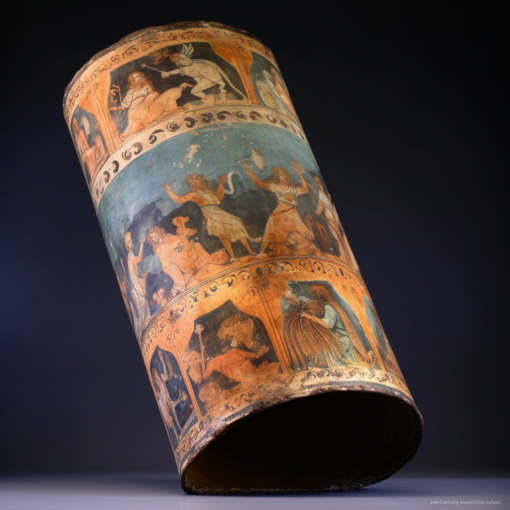Greetings, dear readers and fellow space-time travelers,
It is I, Percival Q. Higginbottom, your trusty guide to the unknown, the unexplored, and the highly fascinating. Today, we find ourselves journeying through the winding corridors of human imagination, all the way to the stars, as we delve into the captivating world of science fiction.
Ah, science fiction! A genre that dares to dream, to ask “What if?” and to explore the furthest reaches of the cosmos without ever leaving our armchairs. From the mind-bending concepts of time travel to the ethical dilemmas of artificial intelligence, science fiction invites us to ponder the very fabric of reality.
A Brief History of the Genre
Our journey begins in the 19th century, where pioneers like Jules Verne and H.G. Wells laid the groundwork for the genre. Verne’s “20,000 Leagues Under the Sea” transported readers to the ocean depths, while Wells’ “The War of the Worlds” unveiled an invasion from Mars. These works were more than mere tales of adventure; they were an exploration of human ingenuity and the limitless possibilities of scientific advancement.
The Golden Age of Science Fiction
Fast forward to the mid-20th century, and we find ourselves in the Golden Age of Science Fiction. Isaac Asimov’s “Foundation” series, Arthur C. Clarke’s “2001: A Space Odyssey,” and Robert A. Heinlein’s “Stranger in a Strange Land” challenged conventional thinking and inspired generations of dreamers.
The Philosophical Depths
The genre is not content with mere spectacle; it engages with profound philosophical questions. Philip K. Dick’s “Do Androids Dream of Electric Sheep?” asks what it means to be human. Ursula K. Le Guin’s “The Dispossessed” explores the utopian ideals of society.
The Modern Era: Diversity and Innovation
Today, science fiction continues to evolve, reflecting the diverse voices and complex issues of our time. Writers like N.K. Jemisin, Neal Stephenson, and Liu Cixin are pushing boundaries and challenging norms.
In Conclusion
Dear friends, science fiction is more than laser guns and spaceships. It’s a genre that ignites the imagination, prompts us to question, and offers a lens through which to view our present and future. As we stand on the cusp of a new era in technology and exploration, let us remember the power of the written word to transport, inspire, and enlighten.
Until our next adventure,
Yours faithfully,
Percival Q. Higginbottom

And there we are, another literary expedition completed! Do share your thoughts and favorite works of science fiction in the comments. The cosmos awaits your input!





66 thoughts on “Science Fiction: A Journey Through Time and Space with the Mind”
Nice post. I learn something totally new and challenging on websites
I liked it as much as you did. Even though the picture and writing are good, you’re looking forward to what comes next. If you defend this walk, it will be pretty much the same every time.
Hello my loved one, I want to say that this post is fantastic, well-written, and contains nearly all important data. I woud want to see more posts
Admin, this was really lovely. I appreciate your thoughtful comments.
Somebody essentially help to make significantly articles Id state This is the first time I frequented your web page and up to now I surprised with the research you made to make this actual post incredible Fantastic job
I have read some excellent stuff here Definitely value bookmarking for revisiting I wonder how much effort you put to make the sort of excellent informative website
Thank you for the good writeup It in fact was a amusement account it Look advanced to far added agreeable from you However how could we communicate
Hi, good post. Your website appears to have an issue with Internet Explorer. This problem will cause a lot of people to miss your good content because IE is still the most common browser.
I just like the helpful information you provide in your articles
I do believe all the ideas youve presented for your post They are really convincing and will certainly work Nonetheless the posts are too short for novices May just you please lengthen them a little from subsequent time Thanks for the post
What a fantastic blog layout! For what duration have you been blogging? You make it look so easy. Both the general design and substance of your website are excellent.
Fantastic site A lot of helpful info here Im sending it to some buddies ans additionally sharing in delicious And naturally thanks on your sweat
I do agree with all the ideas you have introduced on your post They are very convincing and will definitely work Still the posts are very short for newbies May just you please prolong them a little from subsequent time Thank you for the post
I appreciate your insightful post. It was actually pretty fun. You seem to have reached a far more agreeable level now. But how can we continue to communicate?
I loved as much as you will receive carried out right here The sketch is attractive your authored material stylish nonetheless you command get got an impatience over that you wish be delivering the following unwell unquestionably come more formerly again since exactly the same nearly a lot often inside case you shield this hike
Hello i think that i saw you visited my weblog so i came to Return the favore Im trying to find things to improve my web siteI suppose its ok to use some of your ideas
Hi i think that i saw you visited my web site thus i came to Return the favore I am attempting to find things to improve my web siteI suppose its ok to use some of your ideas
Balanceo dinamico
Dispositivos de balanceo: esencial para el desempeño suave y efectivo de las dispositivos.
En el mundo de la avances avanzada, donde la rendimiento y la fiabilidad del sistema son de máxima trascendencia, los aparatos de calibración cumplen un rol vital. Estos aparatos específicos están creados para balancear y asegurar componentes móviles, ya sea en maquinaria manufacturera, vehículos de desplazamiento o incluso en equipos caseros.
Para los expertos en soporte de sistemas y los profesionales, utilizar con aparatos de equilibrado es crucial para asegurar el rendimiento fluido y seguro de cualquier mecanismo móvil. Gracias a estas opciones modernas sofisticadas, es posible disminuir notablemente las sacudidas, el zumbido y la presión sobre los soportes, mejorando la longevidad de componentes caros.
También significativo es el función que cumplen los aparatos de equilibrado en la asistencia al consumidor. El apoyo experto y el conservación constante empleando estos aparatos posibilitan dar soluciones de óptima calidad, incrementando la bienestar de los clientes.
Para los propietarios de proyectos, la contribución en estaciones de ajuste y medidores puede ser clave para mejorar la eficiencia y productividad de sus aparatos. Esto es sobre todo importante para los dueños de negocios que manejan pequeñas y intermedias organizaciones, donde cada detalle es relevante.
Además, los dispositivos de balanceo tienen una extensa utilización en el campo de la seguridad y el gestión de estándar. Permiten identificar probables problemas, evitando arreglos onerosas y daños a los equipos. Incluso, los información recopilados de estos equipos pueden aplicarse para mejorar métodos y aumentar la visibilidad en sistemas de búsqueda.
Las sectores de utilización de los sistemas de calibración abarcan variadas industrias, desde la elaboración de bicicletas hasta el supervisión ambiental. No importa si se trata de grandes producciones industriales o reducidos espacios domésticos, los aparatos de equilibrado son fundamentales para garantizar un funcionamiento eficiente y sin riesgo de detenciones.
Puraburn I just like the helpful information you provide in your articles
This is such an important and often overlooked topic Thank you for bringing attention to it and offering valuable advice
Your article helped me a lot, is there any more related content? Thanks!
Thanks for sharing. I read many of your blog posts, cool, your blog is very good. registrera dig f”or gate
Your article helped me a lot, is there any more related content? Thanks!
**mindvault**
mindvault is a premium cognitive support formula created for adults 45+. It’s thoughtfully designed to help maintain clear thinking
**sugarmute**
sugarmute is a science-guided nutritional supplement created to help maintain balanced blood sugar while supporting steady energy and mental clarity.
**gl pro**
gl pro is a natural dietary supplement designed to promote balanced blood sugar levels and curb sugar cravings.
**zencortex**
zencortex contains only the natural ingredients that are effective in supporting incredible hearing naturally.
**mitolyn**
mitolyn a nature-inspired supplement crafted to elevate metabolic activity and support sustainable weight management.
**yusleep**
yusleep is a gentle, nano-enhanced nightly blend designed to help you drift off quickly, stay asleep longer, and wake feeling clear.
**prodentim**
prodentim an advanced probiotic formulation designed to support exceptional oral hygiene while fortifying teeth and gums.
**synaptigen**
synaptigen is a next-generation brain support supplement that blends natural nootropics, adaptogens
**vitta burn**
vitta burn is a liquid dietary supplement formulated to support healthy weight reduction by increasing metabolic rate, reducing hunger, and promoting fat loss.
**nitric boost**
nitric boost is a dietary formula crafted to enhance vitality and promote overall well-being.
**glucore**
glucore is a nutritional supplement that is given to patients daily to assist in maintaining healthy blood sugar and metabolic rates.
**wildgut**
wildgutis a precision-crafted nutritional blend designed to nurture your dog’s digestive tract.
**breathe**
breathe is a plant-powered tincture crafted to promote lung performance and enhance your breathing quality.
I don’t think the title of your article matches the content lol. Just kidding, mainly because I had some doubts after reading the article. https://accounts.binance.com/fr/register-person?ref=T7KCZASX
Can you be more specific about the content of your article? After reading it, I still have some doubts. Hope you can help me.
Ready to roll the dice at 7betcasino! I’m expecting a smooth experience and some exciting games. Let’s see if lady luck is on my side! Check it out: 7betcasino
Fortunedragonbr is alright for Brazilian players. They need to improve their support options. I would expect faster answers! fortunedragonbr
Just joined netabetcasino and I’m already impressed! The bonuses look amazing. Time to test my luck! Give it a shot: netabetcasino
Đối với những ai coi trọng sự bảo mật, slot365 login là điểm đến lý tưởng. Hệ thống tường lửa đa tầng giúp thông tin cá nhân của bạn luôn được an toàn. TONY12-30
I really like what you guys are usually up too. Such clever work and coverage! Keep up the good works guys I’ve added you guys to my blogroll.
Howdy! I’m at work surfing around your blog from my new iphone 4! Just wanted to say I love reading your blog and look forward to all your posts! Keep up the superb work!
Wow, this paragraph is fastidious, my younger sister is analyzing these kinds of things, thus I am going to tell her.
I like this web site very much, Its a really nice billet to read and incur information.
**backbiome**
backbiome is a naturally crafted, research-backed daily supplement formulated to gently relieve back tension and soothe sciatic discomfort.
**vivalis**
vivalis is a premium natural formula created to help men feel stronger, more energetic, and more confident every day.
Every weekend i used to visit this site, as i want enjoyment, as this this site conations actually nice funny data too.
**balmorex pro**
balmorex is an exceptional solution for individuals who suffer from chronic joint pain and muscle aches.
Hello! I’ve been following your web site for a while now and finally got the courage to go ahead and give you a shout out from Houston Texas! Just wanted to tell you keep up the fantastic work!
I will right away grasp your rss feed as I can’t find your e-mail subscription link or newsletter service. Do you’ve any? Please let me recognize in order that I may subscribe. Thanks.
**synadentix**
synadentix is a dental health supplement created to nourish and protect your teeth and gums with a targeted combination of natural ingredients
I constantly emailed this blog post page to all my friends, since if like to read it afterward my links will too.
You made some really good points there. I looked on the web for more info about the issue and found most people will go along with your views on this web site.
I love it whenever people come together and share ideas. Great site, stick with it!
**finessa**
Finessa is a natural supplement made to support healthy digestion, improve metabolism, and help you achieve a flatter belly.
I was able to find good info from your blog articles.
I don’t think the title of your article matches the content lol. Just kidding, mainly because I had some doubts after reading the article.
I do not even know how I ended up here, but I thought this post was good. I do not know who you are but definitely you’re going to a famous blogger if you are not already 😉 Cheers!
I am sure this piece of writing has touched all the internet users, its really really good paragraph on building up new website.
You’ve made some decent points there. I checked on the net for more info about the issue and found most individuals will go along with your views on this web site.
I conceive this web site contains some rattling fantastic information for everyone :D.
I just could not leave your website before suggesting that I actually loved the usual info an individual provide to your guests? Is gonna be again steadily to inspect new posts
These are genuinely wonderful ideas in concerning blogging. You have touched some fastidious points here. Any way keep up wrinting.
I like it when individuals get together and share thoughts. Great website, stick with it!